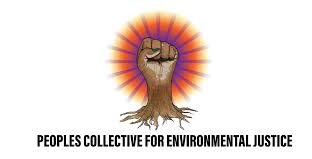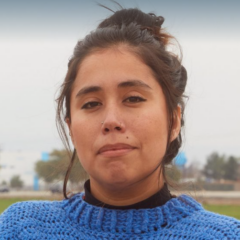Most drivers on the way to Los Angeles don’t see the growing families and developing communities when passing by the Inland Empire (IE). Just 40 miles east of Los Angeles, the IE is a region three times the size of Rhode Island and is home to more than 4.7 million people with the majority identifying with Latine heritage. It is also the region with some of the worst air quality in the country, as a main entryway and corridor to deliver imported goods from California ports to the rest of the country.
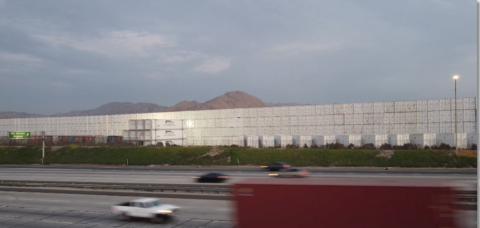
In 2022, almost 10 million Twenty-Foot Equivalent units were managed by the Port of Los Angeles. Long Beach experienced similar traffic, making these the busiest commercial ports in the U.S. Millions of people, businesses, and governments across the country buy goods from overseas that come through these ports, and most goods will be delivered by train or truck. These giant commercial truck engines can reach six times the size and weight of a car engine and many diesel-powered locomotives rumbling through the IE can stretch up to a mile or longer.
Initially a rural and agriculture-dependent community, the area has grown and now serves as an important goods-movement junction between the ports and the rest of the country. Since the 1970s, the former sleepy agricultural area has seen relentless growth in the warehouse industry and now comprises more than 4,000 warehouses, taking up 40 square miles of land.
“I started seeing that industrial part get closer and closer to the neighborhoods, to the point where we now have Amazon warehouses right next to high schools, right next to middle schools, right next to parks.” says Andrea Vidaurre, Co-founder, Policy Analyst, and Advocate for the People’s Collective for Environmental Justice (PC4EJ).
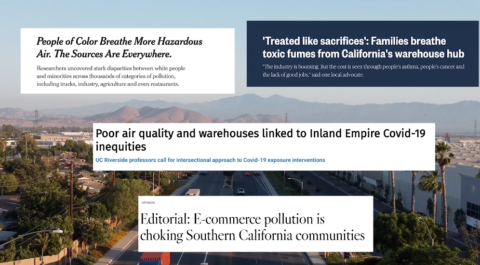 The surge in warehousing and trucking in the IE has also carried with it major environmental concern, especially about air pollution. Advocates and IE residents were compelled to fight for their rights to an environment that does not put a disproportionate health burden on local residents.
The surge in warehousing and trucking in the IE has also carried with it major environmental concern, especially about air pollution. Advocates and IE residents were compelled to fight for their rights to an environment that does not put a disproportionate health burden on local residents.
Like many IE residents, Vidaurre has seen firsthand the effects of the rise in the warehouse industry. It was this experience that led her to create PC4EJ as an organization designed to address the concerns of the IE community and fight for environmental justice.
PC4EJ is a women-led, IE-based environmental justice group centered in community organizing. Much of their work involves educating local residents and getting them involved in decisions that impact their health and livelihoods and ensuring their voices are heard in civic processes. U.S. Energy Foundation (EF) has supported their work since 2021.
Daily, IE residents see thousands of trucks driving through their neighborhoods and their communities. These trucks pick up cargo from the Ports of Los Angeles and Long Beach and drive through the IE, emitting toxic fumes and carbon dioxide, a global climate pollutant. The emissions from these massive trucks is why PC4EJ emphasizes local work to protect resident’s health in the IE.
PC4EJ collaborates with various national environmental organizations, environmental justice coalitions, the University of Southern California, and labor unions in Southern California that have also seen the effects of air pollution and have made progress to change the system by working together.
“We cannot have justice for one community without having it for another. We believe those types of partnerships we are empowering and building are really important” says Vidaurre.
In working with a diverse cohort of people and embracing collaboration, PC4EJ is determined to challenge the inaccurate narratives that residents must choose between jobs or their health. PC4EJ is committed to including the voices of all members of the community, especially workers who are at the frontline of the freight industry.
“Communities and workers are not separate entities” says Vidaurre. Fighting for workers rights and against worker exploitations is part of PC4EJs mission. “A worker goes home eventually to their community and their community members, and vice versa.”
Through diligent work and collaboration, PC4EJ has helped inform and educate decision- makers in support of historic regulations on trucking and goods movement in California. To ensure the regulations are carried out equitably, PC4EJ is now working with and supporting the California Air Resources Board along with other agencies responsible for implementing these regulations. Additionally, PC4EJ continues to work with local communities to create clean air action plans they wish to see implemented. “Communities have created some plans for themselves that they want to see, like bettering their infrastructure, addressing housing, and rising rent,” says Vidaurre.
“Transportation is the #1 carbon pollution source in the U.S and this marks the first time it has been recognized in the process of goods movement. Moving forward it is essential to ensure that the transition to clean transportation is equitable, especially for frontline communities,” says Aminah Zaghab, EF’s Vice President, Programs.
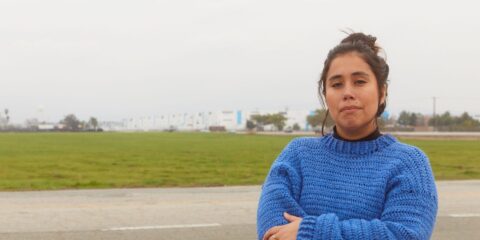
Earlier this year, Andrea Vidaurre was awarded the prestigious Goldman Environmental Prize for the incredible transportation policy work she and her team focus on in the IE to protect communities from trucking and rail emissions.
With this accomplishment and recognition, Vidaurre hopes that PC4EJ’s work gets expanded to include more people affected by freight and goods movement, and for everyone to better understand how their goods get to their homes and businesses so that we ultimately make an impact on the climate and health effects posed by the freight sector.
 Story author Henry Soria-Torres was a U.S. Energy Foundation intern in the summer of 2024.
Story author Henry Soria-Torres was a U.S. Energy Foundation intern in the summer of 2024.
